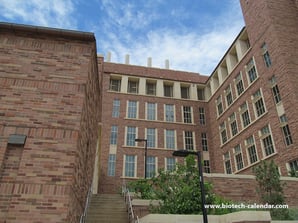Researchers at the University of Colorado Boulder have received a $1.1 million grant from the Bill & Melinda Gates Foundation to support development of next-generation vaccines. If the project is successful, these new vaccines will be able to defend against diseases with just one shot and won't need to be refrigerated. These improvements could have an immense impact on the difficult challenge of dispensing life-saving immunizations.
The project will be a collaborative effort between three CU investigators, combining a wide range of skillsets and ideas. One of the project's investigators is Professor Bob Garcea of the Department of Molecular, Cellular and Developmental Biology and the BioFrontiers Institute. Garcea directs a lab within the Jean L. and Jack C. Thompson Vaccine Development Laboratory that has been working on development of new vaccines, such as those for human papillomavirus, a virus that can cause cervical cancer and is especially devastating in developing countries.

(Injection of human papillomavirus vaccine. Image courtesy of Wikimedia Commons.)
Professor Ted Randolph of the Department of Chemical and Biological Engineering, also one of the project's key investigtors, has developed dosage forms for vaccines that are resistant to damage from heat or cold. The vaccines are in a glassy powder state, which allows them to be stored at temperatures "as high as 120 degrees Fahrenheit for three to four months without losing efficacy," according to Randolph.
Randolf and Garcea both work in the Jennie Smoly Caruthers Biotechnology Building (JSCBB) at CU Boulder and have been collaborating on vaccine studies over the last two years. The new research grant will take their efforts a step further by combining their advances with techniques developed by Al Weimer, also of the Department of Chemical and Biological Engineering in the JSCBB.
Al Weimer's lab has developed a vaccine coating process called atomic layer deposition. The process covers vaccine microparticles with nanoscopic protective layers of aluminum oxide. This forms a protective barrier for the vaccine particles and helps trigger the body's immune response, which increases the efficacy of the vaccine.
The new collaboration between the three investigators will focus on creating an extended release, multilayer microparticulate dosage form for vaccines. This will consist of an inner core of stabilized vaccine, a coating of aluminum oxide layers, an additional layer of vaccine, and an outer covering of a glassy powder.
When the vaccine is injected, the outer vaccine layer will provide an initial dose of vaccine. Then, the aluminum oxide layer will slowly dissolve so that the inner core will be released, which acts as a second dose of vaccine. This way patients receive additional "doses" of vaccine without needing a second injection.
Combining each investigator's innovations into one new vaccine form will be a difficult challenge, but the team is hopeful that it will succeed. “We’ve done many of the individual parts of this project,” Randolph said. “Now we’ve got to put those pieces together and have it work.”

The collaboration is made possible thanks to the close proximity of the three investigators on CU Boulder’s East Campus, as well as to the interdisciplinary mission of the BioFrontiers Institute. The institute aims "to drive innovation by combining researchers from different fields," and the new collaborative effort between Garcea, Randolf, and Weimer is a prime example of this mission.
“One of the hopes [of the BioFrontiers Institute] is that investigators will, by their proximity, do new and interesting things,” said Garcea. “In a sense, we’ve fulfilled the mission. If the technology works, we’ve really fulfilled the mission.”
Life science professionals are invited to attend an upcoming event at the University of Colorado, Boulder. The 19th Annual BioResearch Product Faire™ event at CU Boulder will be held Summer 2017 on the East Campus. Life science professionals are invited to attend the annual on campus trade fair for free to learn about new lab equipment and technologies available. Click the button below for additional information or to pre-register.

If you are a laboratory equipment supplier, this is an excellent opportunity to meet face to face with life science researchers at this well-funded research market and educate them about your lab or chemical supply products. Call us at 530-272-6675 or click on the link below to reserve a space and increase your scientific sales in 2017.


